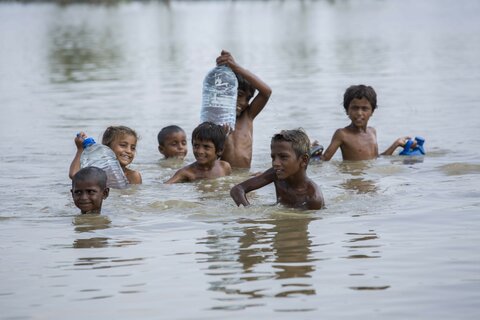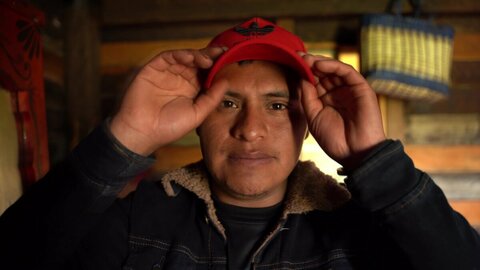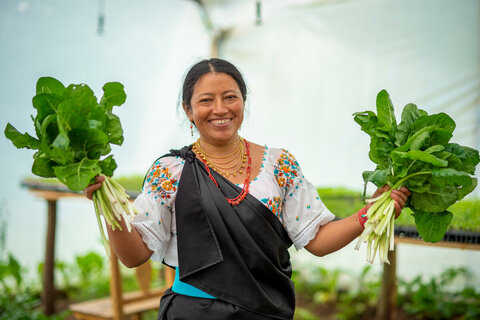‘Double burden’: Malnutrition is biting into Guatemala’s economy, says report

By Peyvand Khorsandi
Inadequate nutrition is taking a toll on people in Guatemala and risks turning back years of development gains, according to a new report published last week (Wednesday 30 September).
Data from 2018 — the year that is the focus of the study — shows the country lost US$ 12 billion to undernutrition, overweight and obesity, equal to 16.3 percent of its gross domestic product.
Honduras: ‘The WFP e-card means more than putting food on the table for LGBT+ people — it means…

The effect on children and young people is a particular worry. "Guatemala's future is at stake," said Miguel Barreto, World Food Programme (WFP) Regional Director for Latin America and the Caribbean.
Only 9 per cent of children suffering undernutrition finished primary school, says the report, while 100,000 students had to repeat a grade, at the cost of US$ 1,000 — the bulk of which is footed by the state, leaving families to pay around US$ 300.

"We cannot ignore this evidence and we cannot afford to lose a significant chunk of valuable resources that could instead have supported development and prosperity," Barreto added. "It affects everyone, directly or indirectly."
Guatemala's Ministry of Health lists close to 20,000 cases of acute malnutrition in children aged under 5.
WFP recently helped launch the Nutrition and Health Brigades, a project led by the government's Secretariat of Food and Nutrition Security (SESAN), training women to identify and monitor cases of acute malnutrition, and alerting authorities to cases where intervention is required.

Before the COVID-19 pandemic, an emergency food security assessment found 2.3 million Guatemalans were food insecure, with up to 500,000 severely. However, a new WFP remote assessment finds that 4 million people have a poor food intake, of which 2.8 million — in a country of 17 million — are severely food insecure.
Published in Spanish by WFP and the Economic Commission for Latin America and the Caribbean (ECLAC), the report — El costo de la doble carga de la malnutrición: Impacto social y económico en Guatemala (Cost Of The Double Burden of Malnutrition) — says the health cost of undernutrition and related diseases alone was US$ 365 million.
"That's 45 percent of the total 2018 budget of the Ministry of Public Health," said Barreto.
Problems are exacerbated by climate shocks. Guatemala is among the 10 countries most vulnerable to climate change in the world and most exposed to natural hazards in the Latin America and Caribbean region. At a national level, 64 percent of the households report income loss due to climate events.

Catalina Hernández is a poor farmer who came to San Mateo Ixtatán, a town located 46 kilometres from the border with Mexico, to purchase fresh food. Speaking in her native Chuj language, she has told WFP: "We planted corn and it was lost due to the storm rains."
She adds: "In our communities, health workers come to visit our homes to measure the height and weight of our children. If our children are malnourished, we are included in this programme."
Alicia Bárcena, Executive Secretary of ECLAC, called on countries "to invest in public policies that lead to a crisis recovery based on the 2030 Agenda." She added that the figures pointing to poverty were mirrored across the region: "The double burden of malnutrition is increasingly affecting the populations of Latin America and the Caribbean, particularly those in situations of poverty and vulnerability."
In Guatemala, the health cost of overweight, obesity and related diseases reached US$ 3.5 billion in 2018.
Pakistan: World Food Programme calls for $500,000 to aid flood response

"The next 25 to 30 years depend on our current actions to accelerate the reduction of malnutrition," Maritza Méndez, Secretary of the Secretariat of Food and Nutrition Security (SESAN) of Guatemala, has said. "We must act now so that the future working population is made up of healthy people, a population that has a better quality of life together with their families and communities."
The report was supported by the Institute of Nutrition of Central America and Panama (INCAP), the Ministry of Public Health and Social Assistance (MSPAS), and SESAN. It is part of a series on malnutrition in Latin America and the Caribbean.


